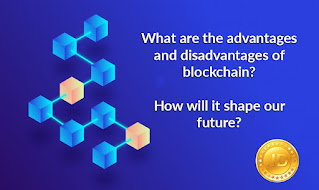A blockchain originally is a growing list of records, called blocks, that are linked using cryptography. Each block contains a cryptographic hash of the previous block, a timestamp, and transaction data. Blockchain was introduced by Satoshi Nakamoto in the year 2008 and was implemented in the year 2009 to serve as a cryptocurrency named Bitcoin.
Blockchain is performed from peer to peer globally where there is no third party required to validate the transaction process. The two parties involved do not need a third party as they have trust. The blocks are created one after the other in the chain, hence it is a completely transparent and secure process and the transactions cannot be erased form the blockchain or be re-written once it is done.
Blockchains are important because they allow for new efficiency and reliability in the exchange of valuable and private information that once required a third party to facilitate, such as the movement of money and the authenticity of identity.
Advantages of Blockchain technology
Immutability and Transparency — Each block is visible to every member of the network, ensuring trust between parties. As one block is linked to another block in a transaction process across the distributed ledger, it is not possible to delete or overwrite the process.
Consensus — the parties in the blockchain agree to the process and then approve on the transactions, therefore it makes the transactions legitimate and then added to the blockchain.
Process integrity — The process is built in a way that it operates between two parties where there is no need for the third party to validate the transactions. Hence, once transactions are done the block created after another in a chain cannot be undone to maintain high levels of security.
Security — Blockchain is highly secure as every individual who enters a blockchain is provided with a unique identifier linked to its account and it is highly encrypted. This ensures that the owner of the account himself is doing the transactions.
Faster processing — Blockchain is cloud-based and supports digital currency like cryptocurrency. Currency can be transferred from one side to another within a few seconds, unlike the way it takes to transfer the fiat currency.
Lower transaction costs — Apart from faster transactions, it also offers a lower transactional cost. As there are no middle parties involved, there are no hidden costs for making a transaction except a small fee is paid at the exchanges.
Disadvantages of Blockchain technology
Large energy consumption — With the new technology and faster transactions, blockchain requires high consumption of power as it performs the mining process. Keeping a real-time ledger is one of the reasons for this huge energy consumption.
Maintenance cost — Maintaining the hardware to run such a high level of transactions and perform such complex processes requires huge costs for its operations.
Volatility — Many cryptocurrencies work on decentralized blockchains which makes it volatile to the market. The prices for these cryptocurrencies may fluctuate anywhere between 5 to 25% in a single day also.
Transaction Delays — One of the drawbacks of the major blockchains that have been created so far is that they usually take a fairly long time — typically a few hours to register the transactions also sometimes.
Doesn’t Guarantee full transparency — Moving data to a blockchain can be one way to help make your software project or company more transparent. But it doesn’t suddenly make everything about “open.” You could have a closed-source application that stores data on a blockchain, for example. In that case, no one except you would know exactly how your software operates, even though its data lives on a blockchain.
Apart from discussing its advantages and disadvantages, blockchain can widely affect in various ways to shape our lives for a better future. We can understand this based on certain use cases such as:
Decision making
Blockchain can help our businesses and government in shaping many policies and their implementation due to its transparency and immutability. It can further increase the trust between parties, reducing corruption, and supporting the bureaucracy.
Healthcare
It can help the medical service providers to benefit from its smart contract feature and streamline one of the most difficult works of aligning and preparing huge contracts for various parties without any mistakes and in a secure way. Along with that, it can help procure the medical records data in a certain timeframe and timestamp making its further use for any further medical research, potentially curing diseases or providing insights for planning effective treatment.
Identity
Impersonation and identity theft have been a common mishap but with blockchain, one can store and secure their data and biometrics on blockchain and it can never be defrauded.
Similarly, blockchain has many other uses and positive effects in shaping our life for a better future.

No comments:
Post a Comment